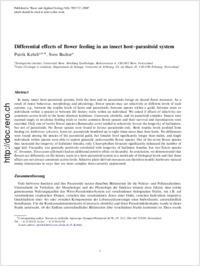Differential effects of flower feeding in an insect host–parasitoid system
- Kehrli, Patrik Zoologisches Institut, Universität Bern, Abteilung Synökologie, Switzerland - Unité d’écologie et évolution, Département de biologie, Université de Fribourg, Switzerland
- Bacher, Sven Zoologisches Institut, Universität Bern, Abteilung Synökologie, Switzerland
-
10.10.2007
Published in:
- Basic and Applied Ecology. - 2008, vol. 9, no. 6, p. 709-717
English
In many insect host–parasitoid systems, both the host and its parasitoids forage on shared floral resources. As a result of insect behaviour, morphology and physiology, flower species may act selectively at different levels of such systems, e.g., between the trophic levels of hosts and parasitoids, between species within a guild, between sexes or individuals within a species or between life history traits within an individual. We asked if effects of selectivity are consistent across levels in the horse chestnut leafminer, Cameraria ohridella, and its parasitoid complex. Insects were exposed singly in no-choice feeding trials to twelve common flower species and their survival and reproduction were recorded. Only one of twelve flower species (Ranunculus acris) tended to selectively favour the longevity of leafminers, but not of parasitoids. No flower species were found to favour parasitoids only. Both trophic levels profited from feeding on Anthriscus sylvestris, however, parasitoids benefited up to eight times more than their hosts. No differences were found among the species of the parasitoid guild, but females lived significantly longer than males, and single individuals within species were able to exploit generally unfavourable flower species. Out of the seven flower species that increased the longevity of leafminer females, only Chaerophyllum hirsutum significantly enhanced the number of eggs laid. Fecundity was generally positively correlated with longevity of leafminer females, but two flower species (C. hirsutum, Taraxacum officinale) had an additional positive effect on fecundity. In conclusion, we demonstrated that flowers act differently on life history traits in a host–parasitoid system at a multitude of biological levels and that these effects are not always consistent across levels. Selective plant-derived resources can therefore modify herbivore–natural enemy interactions in ways that are more complex than currently appreciated.
- Faculty
- Faculté des sciences et de médecine
- Department
- Département de Biologie
- Language
-
- English
- Classification
- Biological sciences
- License
-
License undefined
- Identifiers
-
- RERO DOC 10695
- DOI 10.1016/j.baae.2007.07.001
- Persistent URL
- https://folia.unifr.ch/unifr/documents/300839
Statistics
Document views: 124
File downloads:
- pdf: 170
